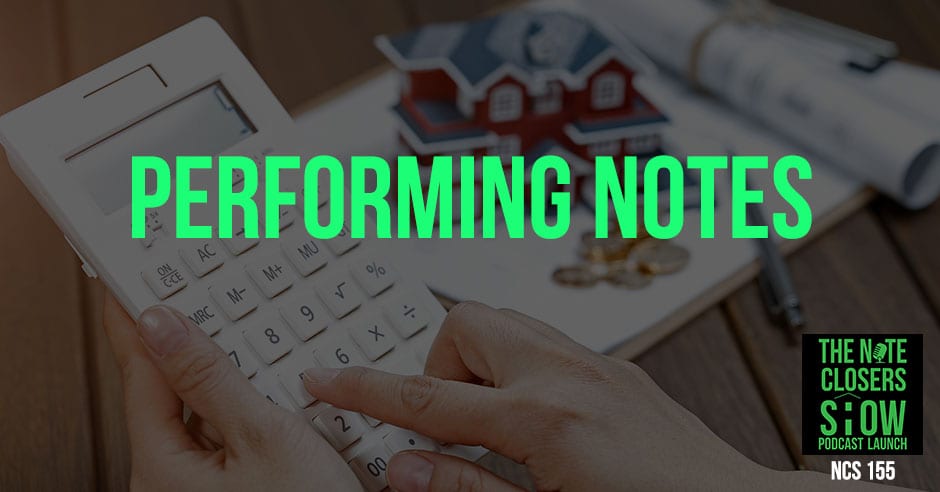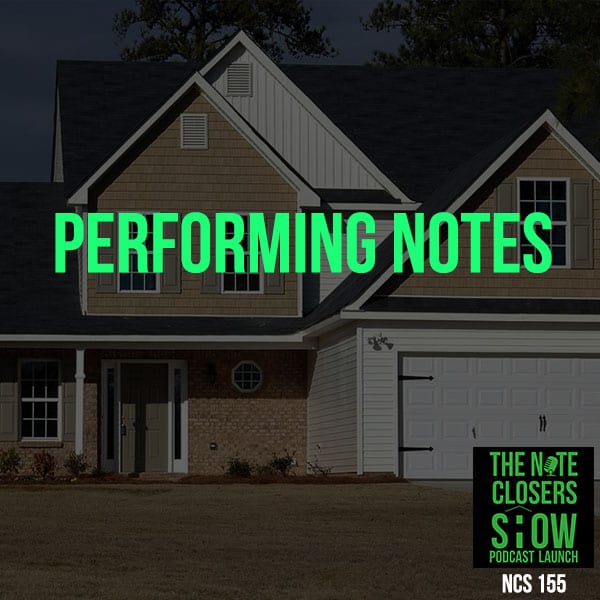
Scott discusses using performing notes in your note strategy.
Listen to the podcast here
Performing Notes
Today we’re going to talk a little bit about performing notes. What we’d like to do here at We Close Notes on a regular basis is we like to offer up notes available for sale. We give different tapes in that we look at and buy for our own portfolio. Others send them in that we look to help them move. One of the great things that we come across a lot of times are non-performing notes which is our bread and butter, but also a lot of performing notes.

A contract for deed is that the owner of the property has offered a financing to a buyer.
A contract for deed is that the owner of the property has offered a financing to a buyer. Most of the time we see a contract for deed for large funds with about large pools of REOs that are $75,000 of value, and they’re looking to sell these off but they don’t want to go through the expensive and time-consuming cost to foreclose on the borrower. It’s more of a rent-to-own. They have a normal mortgage payment, they’re paying the taxes and the insurance, but they aren’t actually in ownership of the deed of the property until they have paid the loan off.
What’s great is, in most cases, most states, you’re evicting versus foreclosing, so it’s a much faster process. What also is nice is that as real estate investors, especially if you’re in the note game, ultimately, you’re probably looking more so than anything else to end up with a performing note. If you buy a non-performing note, your goal is to get it worked out and hopefully get them to re-perform with you. That’s a beautiful thing.
A lot of people, depending on what their investment model is or what their goals are, if they’re working full-time or they’re looking more for passive income, buying performing notes is a great business model for them. They can buy something, it just starts turning cashflow, helping them make somewhere between 8% to 15% yield on their money depending on the asset, and they’re happy. Maybe they’re a little bit on a fixed income or they’re at the point where they’re like, “I’m happy making 12 where I have to do very little work. My time is valuable to me.”
We like picking a non-performing stuff and get it to re-perform. We had two borrowers contact us yesterday. We actually had the city contact us that one of the borrowers is trying to get the landlord or the property owner permission to sign off on a daycare, which is great. We’ll follow up a phone call after that. What’s great about those things is we bought those at non-performing prices with the goal to have them turned into performing. The yield is going to be phenomenal, and it is phenomenal, from the ones that we’re seeing, usually 20% or greater. That’s how we model our business, especially with all this contract for deeds. We’re looking for people that have been paying on time or paying in the last twelve months. It’s turned out that some of these assets that we’ve bought, people have been paying on time. They have not gone delinquent, which is a true win-win for us. It makes it an easy gain, makes an easy return in the mid 20’s and going from there.
If performing notes is your bag or your big hat, trust me, you’re looking to buy deals that’s going to turn into something good that you will basically just put a big hat up and have a nice siesta, have a nice celebration. You’ll do a little Mexican hat dance because the deals are behind and you’re happy with. They turn into a really great ROI for your IRA or your passive income. A lot of investors, especially when they’re getting into the game, they want to make some income and you’ve got cashflow that you need to have.
If you’re looking at non-performing tapes and you have somebody that sends you performing tapes, oftentimes people don’t have notes for a long time or will end up taking a bit of a discount even on a performing to get a moot. I’ll give you an example. We’re moving some assets right now. What the seller wants, 81% of the remaining balance on a performing note. That’s a really 20% kicker. If it’s already at a 9% coupon rate, it’s about 20% kicker, what does that come to? 20% and 9%, it’s about a 12% return for everybody. That’s not bad. It’s not the greatest but if you’ve got money sitting on the side making you zero or making you 1% or less than 12%, you might as well put your money into something that returning good returns. Sometimes you’ve got to take your hat off of what you’re normally wearing and get a little creative and flip the switch around a little bit, something that makes a little bit more sense for you.
One of the things that we do, and I haven’t done it in a while, is I would identify sellers of performing notes that wanted to see a 12% to 15% yield, and I would go out and bring in somebody else’s funds that want to make 6% to 8%. I would arbitrage that difference. It’s a pretty simple thing to do. You find somebody who’s happy making 6% or 8% and you find an investment that’s going to be paying 12% or 15%. If they’re paying 15%, you can take that extra 7% and put it in your pocket; very easy to do. There are many, many self-directed IRA investors who’ll be happy with an 8% yield on their money, or 6%. That’s one thing you have to keep in mind. How do you find those individuals? You’ve got to market for them. You have to literally market on a regular basis and things going out, networking at IRA events, which means actually marketing out to a list on a county assessor’s website or the county appraisal districts or county clerks where people who have made loans out of their IRAs to find out what kind of return they’re looking for. If they can get a 6% or 8% return, oftentimes they’ll pull the trigger on that.

Taking a non-performing note, get it re-performing so it’s got a great yield, and then bringing in cheap money.
One of the great strategies I like doing as well is taking a non-performing note, get it re-performing so it’s got a great yield, and then bringing in cheap money. What I mean by cheap money is somebody who wants that low return at 6% to 8% and arbitraging either my funds out of the deal or my investors’ funds out of the deal. Give them their money back, they’re good to go, they’re happy, they made a good return. We can do a turnaround and double down, buy two more assets with those funds. Knowing that I’ve got this other investor who’s happy making 8%, now the performing note may be at 15%, so bringing in 7% to me for my work to stay in the deal, my investor’s making 8% and they’re happier than a pig in slop. It allows for you to really make money from money though.
A lot of people are like, “I don’t have money for my own investments.” There’s so much private money sitting out there not making anything. We were at a Quest RIA event. Nathan Long and Nate Hare shared with us that they have $1.2 billion under management, $270 million of it is making zero. What are their opportunity cost? How much money are they losing every year? Let’s think of that. Greg, what is $270 million times 0.08?
$21,600,000.
If those people want to make an 8% return, they’re missing on $21 million. That is a lot when you’re putting those big numbers like that. Let’s figure it out. $100,000 times 8%, that’s $8,000 a year. $8,000 a year, divide that by twelve, $667. There’s a lot of opportunity there. If you’ve got somebody who’s got $100,000 sitting in the sidelines and wants to make 8%, all you’ve got to do is go find out an investment for $100,000 that’s bringing in more than $700 a month on average. If you find an investment or a performing note that’s bringing in 12%, let’s do the numbers on that, very easy. 12% means they get $12,000. If it’s paying out $12,000 a year in income, that’s $1,000 a month. If you got an investor who’s wanting to make 8%, they want to see $667 on average per month. That’s a $333 difference that can go in your pocket. That’s not bad. You’re not going to get rich off of that but if you’ve got a rent, $1,800, you need six of these notes basically performing to cover your house payments. It doesn’t take a lot to do that.
A monkey could collect on performing notes. Of course, you’re going to pay servicing fee, $20, $30 from a servicer like Madison or even FCI. Something that is going to be very cheap and you’ve got to figure that into your cost as well. But you can get some maximum returns by doing very little effort if you needed to. There are a lot of people that do that arbitrage all day long. I like performing note. I go out and I spend time finding cheap money and then go find better deals. They put themselves between the two.
“Great information. If you have no money in the deal, how many deals can you do?” All of them.
If it’s not your own money or if you’re using somebody else’s money, your return is a sideways eight. That’s infinite returns to you for your time. The reason you always want to see probably around a 4% difference between what the deal is paying and your money, is that’s going to give you plenty of room in case of a hiccup or two.
He says, “Sometimes I just need to hear you tell me the obvious. The obvious gets lost in all the great, great, great stuff.”
There are so many ways to make money in the note business. A lot of people forget that sometimes you find a deal that’s paying good and you find cheap money and you just put the two together and make it a true win-win. It’s actually a win-win-win. It’s a win for the seller, who’s getting rid of the asset. It’s a win for the investor who’s making good returns. Of course, it’s a win for you being in the middle of that proverbial investor sandwich. You’re the hotdog in between the investor buns.

Of course, you still do the main three things: Always check value. Always check taxes. Always check title.
Researching a performing note deal. Of course, you still do the main three things. You want to make sure of value. Always check value. Never trust a seller’s BPO. Always check value. You want to make sure you’re still buying a note below property value. Two, you always have to check taxes. That’s an important thing because taxes can go up very, very easily. Three, checking title. That means having the seller provide, “We need a report or you go get a report.” Make sure it’s still clear. Make sure you’re buying a first lien. There are some people that like to buy second liens. You can do that, they’re cheaper. If you’re going to do all the work, I would rather get a $500 check versus a $50 check each month, if you think about it. Plus, you want to be in the first lien position, so if something does go wrong, you control that aspect. Versus in the second lien position, if the first stops paying, you’re at the mercy of the first. Those are the three biggest things.
Then fourth, always, always, always make sure you’re buying a performing note with a licensed servicer. I have talked to several people who have contacted me in the last month, “I got some notes for sale.” At first I’m asking, “How much is this thing and who’s servicing the loan?” They’re like, “We’re servicing the loan.” “No, it’s not worth anything now.” If you are a licensed servicer, great. If you’re only licensed in the state and you’re doing stuff, that’s great, that works. As long as you’ve got that paperwork and the documents to prove the history. Self-servicing is not a great thing to do because it’s very easy to get goofy on the paperwork, and you can lose value and stuff, especially if you have no reminder to foreclose. If you have not been doing a good job on the paperwork and servicing side, you could lose a lot of value very quickly.
Performing notes is a great way to make some great returns. You’re not going to usually see a 24% or 30% return on a performing note, that’s one thing you have to keep in mind. I was talking with an investor and he’s like, “I want to make some offers on these notes and I want to see a 30% yield.” I’m like, “No offense, but you’re smoking crack.” He’s like, “What are you talking about?” I said, “No offense, 30%, why would they ever sell that? If they’re going to sell 30%, I’ll buy the whole damn thing. I’m not going to let you do it. I’ll buy it myself as well.” He goes, “These are lower valued and with the servicing cost figured in and my risk aversion to risk,” that’s fine but don’t be surprised when the seller comes back and counters back or just doesn’t counter at all because you’re way low-balling.
Normal side, when we deal with non-performing notes that we eventually look to sell off after twelve months of seasoning, we usually see a sell price somewhere in the 80%-85% range, sometimes it’s closer to 90% of value of that loan once we’ve got that seasoning. Usually, most note borrowers are buying re-performing, mostly twelve months of seasoning and wants to see somewhere between a 12% to 15% yield.
A company that buys a lot of performing notes that we’ll have somebody on actually through upcoming Note CAMP. Note CAMP stands for Content, Actions, Marketing and Profits. It’s four keys of the note business. Content, you’ve got to have content, quality content. We’re not talking a pitch fest, content from most people doing things. Actions give you the things that they do on a daily, weekly, sometimes hourly basis to make things happen. Big M, marketing, because it’s all about marketing in the business today. You’ve got to be marketing to find deals. You’ve got be marketing to find a borrower. You have to be marketing to find private capital. P, we do all these things to make profit. One of the things that we can do besides the content, actions and marketing is to drive profits to our note business. Sometimes profits are just all about taking over cashflow and cash stream. As far as a borrower taking over a payment stream and that’s what notes are. Some people like partials, I don’t like partials personally. I think if I will do all that work, I might as well just buy the whole thing to make things easier.
Somebody is always asking, “When are you going to talk about partials?” No, I don’t waste my time with partials. It’s great. It’s a very small niche. If you want to deal with partials, you can reach out to First National Acceptance Corporation who will buy a lot of notes. They’re one of the biggest note buyers out there for performing notes and they will often open their bidding process not only a purchase offering for the whole performing note but they will also give you a partial quote, usually in titles about payments for four to six years.
Performing notes, it’s an easy game, it’s an easy bag. One of the things that we do is we do have pretty much monthly note drafts. Sometimes it’s every two weeks, sometimes it’s once a month. It just depends on what’s coming in that makes sense. We get lots of certificates on our way and I’m like, “Yes, that’s my old crap. Yes, that’s some good stuff.” We’ll market it or we’ll buy that stuff first and if we don’t buy it, we’ll market it off for everybody else. When we get a listing, Greg, Nicole, and Jen are working through this stuff. Greg, what are some of the things you’re focused on in this tape? Give everybody an idea.
I was pulling bed, baths, photos, red rates, that’s about it as far as I’ve gotten on this one.
We get a listing in the addresses and we map it. We’re looking at photos. We’ll identity if it’s single-family home or mobile home. Beds, baths, square footage, basically Zillow information. Give me a rough idea of value, and rough idea it means basically an online evaluation. You’re still going to need to pull your own values if you’re going to make offers. Going from there, we try to get some price expectations as well too, so you can see what kind of yield ROI you can see on that stuff as well.

Some people are more visual when they come to learning. Other people are more numbers-based, spreadsheet-based.
We talk about the market. This has been performing for six months or this has been performing for four years. That’s the beautiful thing about that tape is that 40 some assets out of the 55 have at least twelve months or more of seasoning, some have four years of seasoning. That’s a pretty good payment history. There are a few that have been scratch and dent with some hit and miss. The guy pays slow every month but he pays every month but always catches up. They’ve got some other information on this spreadsheet of taxes and insurance and that’s credited in as well. They’re handled by Evergreen Servicing. We’ll try to post photos online as best as we can and make it easier. Some people are more visual when they come to learning. Other people are more numbers-based, spreadsheet-based. I like spread sheets. It’s my matrix. I can see through the lines.
Let’s talk about a few things. If you’re a note investor, what are some of the expenses that you’re going to have along the way that people need to figure into their ROI calculators? One of the great things you have to keep in mind is obviously, servicing costs, recording costs, because you’re going to need to get the assignment recorded. That’s not really expensive. What does it cost us to e-file?
It depends on the county. The assignments are $18. The deeds can run to $60 and $80, so it’s $100 or less usually.
Less than $100, usually around $25 to get recorded. Servicing costs $20 or $30 a month, it depends on who the servicer is. You’ll need to find that out whether you’re using Madison Management. We love Madison, they do a great job. Oftentimes, there’s a boarding fee involved too, you have to keep that in mind. Sometimes servicers will waive that boarding fee if you’re bringing in a chunk of notes to them, if you’re brand new or if they’re running different promotions throughout the year. That’s a good thing.
The one thing that you want to do if it’s a performing note, you don’t really need to have a lot of workout. I’ll leave this in the individual’s decision. If you’re comfortable making the phone and calling them if they go late, then just have it client-managed. If you want them to manage the work outside, then you’re going to want the servicer-managed pricing. That’s going to be a little bit more expensive, somewhere around $60, $75, $100 a month for them to manage the workouts if they’ve got to get involved on the borrower. Hopefully if you’ve got something that you’re buying that’s got 12 to 24 to 36 to 48 months of servicing, you won’t need any client managed.
Also you always have the possibility too of leaving it and having the existing servicing company retain it on their portfolio. If you’re buying a chunk of notes, you might as well do that and leave it with the one servicer. If you’re buying one or two and you have a major servicer somewhere else, it might be best either to move it over so you’ve got everything in one contact versus spreading yourself thin across two different vendors. Honestly, in this line of work in the note business, if you’re in the long-term, you’re going to have probably three to four servicers that you work with on a regular basis. It just depends on the portfolios you’re buying, the service quality, some are better at performing than they are at non-performing. It just works out that way.
If you’re interested, you can go to WeCloseNotes.com and register on the Buy Notes tab. Literally you just go to the website, you should see three boxes pop up there at the home page, and you see where it says Buy Notes. If you click on Buy Notes, it will take you directly to an opt-in page for the Note Funding League. Just give us your information, your email, first name and last name, cell phone number and we’ll make sure to notify you of when the list is going out.
As always, we are huge fans of our past and present military, first responders. If you’re in the military, a coast guard or a first responder, EMS, police, fire fighter, we’d love to comp you and we want to say thank you for your service and for helping making America a safe place and protecting us here at home and far away. If you are a first responder or past or present military, we’d love to comp you into our workshop. Either drop me an email, scott@WeCloseNotes.com. One thing, if you are a first responder, past or present military, we would love a photo of you in uniform.
It’s not required but we always do like to thank you.
We’d like to thank you for your service. If you are interested in plugging in, it’s a workshop, just go to scott@WeCloseNotes.com. Drop me an email. We’d like to comp you in.
What we’ll do is we’ll break down a couple of deals. Two reasons of the portfolios we bought, which we discussed this on episode 153, it was about the performing case study, we expected these to be non-performing but that the borrowers had made payments on it. What’s great is in the transition, we’re going from one servicer to our servicer, going from National Asset Advisors over to our servicing company. Our servicing company is sending that letters. They’re sending that goodbye letters to the borrowers saying, “Thanks for not paying us. We think you can now not pay Madison Management,” but now they’re also giving the borrowers our contact information. Jen’s been getting a few phone calls from borrowers the last couple of days. Some people have been upset a little bit.
They start off upset. I guess they don’t understand what’s going on.
That’s exactly right. The reason I say that though is so people can be prepared. They’re like, “You sold my mortgage?” Some people are using the wrong term, like cancelling in their statements. We’re not cancelling the contract for deed at all.
They think we’re selling their house. One lady thought we’re selling her house or we’re getting rid of her house or something like that.
That’s not the case at all. You had one lady that was quite upset yesterday.
She called three times within 30 to 45 minutes. We were in here during the show and I came back to a very distressed, not-so-friendly voice. She wasn’t saying anything rude, it was her tone. You could sense that.
The stress in her tone.
Yes. She said, “You need to call me back and I need to know what’s going on.” I called her, “This is Jennifer. You called in regards to a loan on your house.” She said, “What’s going on? I have been paying.” She just starts rambling on. She’s going on 90 miles an hour and she has that not Sweet Home Alabama voice.
Is she from Alabama? Where is she from?

Our main goal is to keep you in your home, get you back to your home ownership and make sure that you’re able to do it in a formal manner.
No, she’s in Indiana but she had that southern Alabama drawl. I let her go on her spiel. I was like, “First of all, our main goal is we want to keep you in your home.” She went, “What?” She changed her tune. We talked a little bit as friends, letting her know that our main thing is we had purchased the note and we wanted to keep her in her home and get her back on the right track to having her home ownership. She didn’t understand that. She was like, “What do you mean? I thought you bought this so that you all could take over my home.” I said, “No, that’s not our goal. Our main goal is to keep you in your home, get you back to your home ownership and make sure that you’re able to do it in a formal manner.”
I asked her, “Are you working?” She’s like, “Yeah. My payment is this much just to pay for however many months and then it’s going to drop down to this but I don’t have a disability and my husband’s a truck driver. His income, we can’t really rely upon it.” I was like, “Let’s look and see what we can do. In the meantime though, we’re transitioning from one servicer to another, so I want to make sure that all your information is recorded. So when you get on with our servicer, it’s not showing your backlogs and you’re all behind and they’re trying to modify your loans until you’re paying more to get you caught up. I want everything to be squared away from when you start with us at day one.” We have payment receipts coming in, she’s happy as could be, she was calling me darling by the end of the conversation.
The initial conversation was very combative from her. At the end of it, she was like, “Thank you so much, I didn’t know that they didn’t have all my information recorded. I thought everything was good. Then all of a sudden I just get this letter saying my contract is voided. I don’t understand.” We talked about everything. She ended up telling me about a couple of her kids.
You had bonding moments.
I try to make it personable, let her know we have a face to our name, we have a reputation, we’re out to help. We’re not out just to take money and run. We actually have their best interest at heart. She was telling me about the disability and her husband, we talked about that. I said, “We understand. We’re human, we have hearts. You’ve got to make sure you stay and pay on time. You have my contact information. Call and let us know so we can work something out. Don’t just go quiet and think if you don’t pay and you don’t say anything, everything’s going to be okay. That’s the worst thing you can do.” I already have another phone call from her. I don’t even know what it’s about. She was just like, “Jen, it’s me. Call me back.” It could be in regards to the payment receipts and stuff. One of the things I noticed a lot too, is out of the borrowers I’ve talked to, a lot of them don’t necessarily have receipts for doing ACH payments and so they’re having a hard time. One of them went to a Walmart and paid through some payment branch.
Was it Western Union?
She didn’t say Western Union, so I don’t know. She just was saying, “I need to find my receipts.” Just talking to them and working with them, letting them know, “Don’t stress out.”
If it’s done through ACH though, they should be able to pull bank records for that.
That’s what she’s doing, but that’s the only way that, I guess, the servicer preferred that they did it.
Yes, they could set up monthly, to happen monthly.
I was like, “You know you can set it up as far as a reoccurring.” There are a lot of things we talked about that she wasn’t aware with her old servicer that she’s going to be having the opportunity to with our servicer. It’s actually going really well. We’ve had a lot of positive feedback. The three that we’ve reinstated, it’s all ended well. It’s all very personable. I know where they work. I know that they have income coming in. I know their situation to where we can do some modifications if we need to. It’s nice. They’ve all said it’s nice actually having someone to talk to as opposed to some servicing company that just treats me like another person through the door.
One thing we’ve got to keep in mind with that is we got to hold them accountable to everything. We can’t let them take an inch or they’ll take a mile. We’ve got to give everybody deadlines. You’ve been doing a good job with that and other things, so great, good stuff.
That’s the thing too, not only is NAA referring them to us, where they came from, but our servicers are referring them to us, so they’re both getting the same stuff. My phone has been very jolly lately.
“The borrowers going about 52 days without paying on our note, but I am not worried since she has so little left to pay and our servicing is handling all this. The borrower has done this before and paid two months payments to catch up, etc. Let the servicer worry about it and take care of all this.”
I would agree with you on that at some point. What you have to keep in mind is make sure that the servicer’s keeping the borrower’s feet to the fire. If it’s a habit of 50 days and they do it consistently, eventually at some point, it starts to grow to 60 days, to 90 days. As a lender, you can’t let that happen. You’ve got to keep the servicer really pushing that borrower, “Start paying, pay something. Tell us what the situation is.” The borrower is then getting late fees. That works in your favor a little bit but still, you’ve got to hold the borrower’s feet to the fire to make things happen.
I think it’s good stuff for the day on our episode here. Have a great day. Go make something happen. Make sure to go out and leave us a comment or write us. Love to get your feedback and what you think about the show and how we can best help you in your path down to financial independence and financial freedom through note investing. Have a great day everybody. See you all at the top.
Important Links
- National Asset Advisors
- Note Closer’s Show Podcast Episode 153
- Note Funding League
- Madison Management
- Evergreen Servicing
- First National Acceptance Corporation

